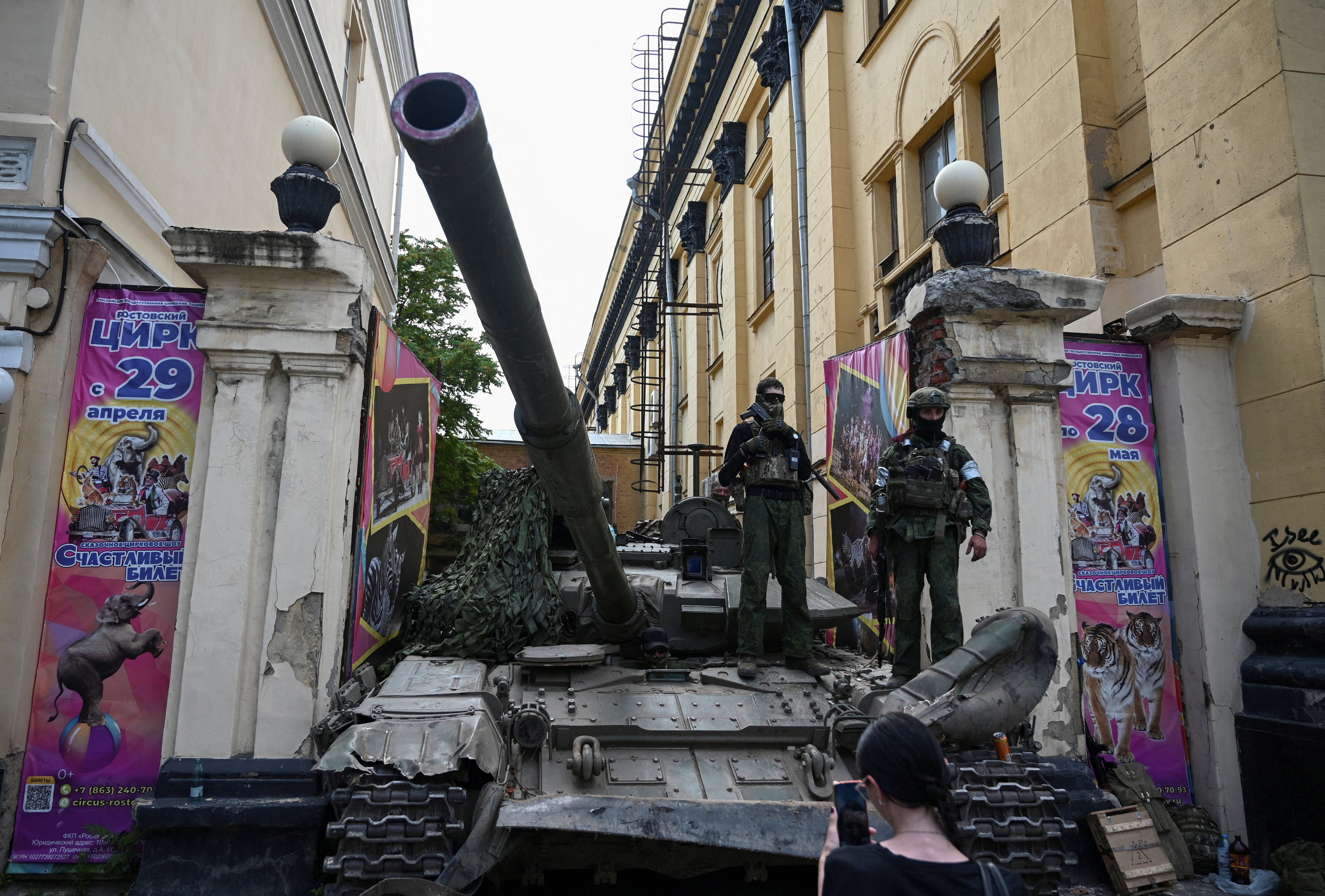There really are no surprises like Russia surprises.
For about 24 hours, it looked like Russian President Vladimir Putin was facing the biggest political challenge of his life. His old friend Yevgeny Prigozhin, head of the powerful Wagner mercenary militia, was leading a column of men toward Moscow in what Putin called an “armed rebellion.” The Kremlin charged him with “mutiny.” Moscow was placed on high-security alert. Putin jetted to St. Petersburg.
And then, just as suddenly as it started, it ended. After easily taking control of two key southern Russian cities – one of them being Rostov-on-don, a major command center for Putin’s war in Ukraine – Prigozhin called the whole thing off after receiving a phone call from Putin-pal Alexander Lukashenko, the president of Belarus.
To “avoid bloodshed,” Prigozhin said, he was ready to turn around and take his men back to their day job: the war in Ukraine. What was the deal that Prigozhin reached with Putin?
First, some background, briefly: Prigozhin, an ex-convict who once worked as Putin’s caterer, runs Wagner Group, a powerful mercenary outfit of as many as 50,000 men that work on Putin’s behalf in several countries in Africa, as well as Syria and, of course, Ukraine. Prigozhin also runs the famous troll farms that tried to meddle in the 2016 US election.
In recent months, he has publicly feuded with the Russian Defense Ministry over strategy and supplies in Ukraine. In Prigozhin's view, Defense Minister Shoigu and other top brass have undermined the war effort through incompetence and corruption. Putin tolerated the sniping at first, but it grew nastier, he tried to put a stop to it by proposing that Wagner be subordinated to the Defense Ministry. Prigozhin wasn’t having it. He claimed, without credible evidence, that Russian troops had attacked his men on Friday, and he immediately launched an armed “justice march” to Moscow, aiming to “stop the evil” of the Defense Ministry. The Wagnerites made it to within 125 miles of the Kremlin before stopping.
The deal. Under the agreement brokered by Lukashenko, the Kremlin has dropped all “mutiny” charges against Prigozhin, who will now go into exile in Belarus. The Wagner fighters who participated in the rebellion will be pardoned, while the rest will be permitted to become contract fighters for the Russian army. A surprisingly peaceful end to the most brazen challenge that Putin has experienced in his two decades of power.
In the end, Prigozhin appears to have judged that he didn’t have enough support in Moscow to go further, while Putin seems to have calculated that a negotiated solution was better than an armed response.
Will this be the end of it? It’s hard to say. Prigozhin’s men have reportedly begun to leave Rostov, but whether he goes quietly into the Belarusian night remains to be seen -- Putin is not known to bury the hatchet with people he considers "traitors" (insert your tea and open-windows jokes here.)
The immediate effect on the war in Ukraine will likely be limited, as the Wagner gang had recently been rotated away from the front lines after taking heavy casualties in the Pyrrhic conquest of Bakhmut. But down the road the Defense Ministry may need to find warm bodies to replace the thousands of demobilized Wagnerites, particularly if Kyiv is able to start making headway in its counteroffensive. It’s also worth considering the ways that dissolving or downsizing Wagner may affect Russia’s interests in Africa and Syria as well.
The biggest questions, however, are in the Kremlin.
No matter how you slice it, the Tsar has taken a hit here. One of his own men, and a reasonably well-known figure in Russia, led an “armed rebellion” that practically cakewalked to the capital. Putin was clearly reluctant to use force to quash the threat on the spot – perhaps he was wary of turning a populist ultranationalist like Prigozhin into a martyr, or else he feared the optics of pitched battles in Rostov – and he had to call in Alexander Lukashenko to sort it out. It’s hard to see how any of that leaves Putin looking stronger, more competent, or more secure than he did on Thursday evening.
After all, for nearly a quarter of a century he has maintained power by playing rival groups off of each other, and eliminating any viable rivals. In this instance, the strategy seems like it nearly backfired. Both his critics and his supporters will take note.
More For You
1,170: The number of high-rise buildings in Kyiv that were left without heating following a barrage of Russian attacks last night on Ukraine’s capital and its energy facilities, per Kyiv Mayor Vitali Klitschko.
Most Popular
What We’re Watching: US critical minerals summit, Rafah crossing reopens, Border violence in Pakistan
U.S. President Donald Trump and Japanese Prime Minister Sanae Takaichi hold up signed documents regarding securing the supply of critical minerals and rare earths, at a bilateral meeting at Akasaka Palace in Tokyo, Japan, October 28, 2025.
Representatives from the European Union, United Kingdom, Japan, and others will meet in Washington this week to discuss a strategic alliance on critical minerals.
Hard numbers: Large protests in Czechia, UAE-linked firm has large stake in the president’s company, & More
80,000: The number of people estimated to be in the streets of Czechia on Sunday to show their support for President Petr Pavel after he blocked the nomination of an environmental minister who performed the Nazi salute and posted Nazi memorabilia.
The US has started handing $1,000 to the bank accounts of newborn babies. But can policies like this one help boost sagging birthrates in advanced democracies?
